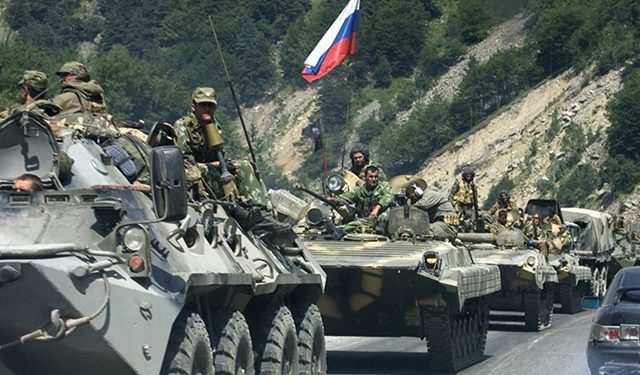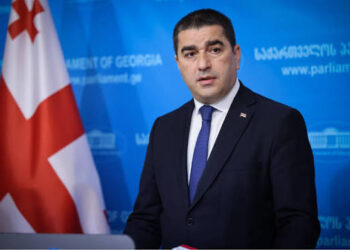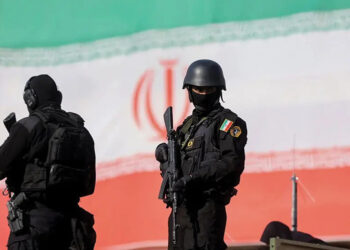“We are at an inflection point. Georgia needs to decide if it’s really committed to its Euro Atlantic path. If it’s not, no-one’s going to drag it into NATO and EU,” – US Army Colonel (Ret.) Robert E. Hamilton, a Black Sea Fellow at FPRI, tells Radio Free Europe’s Georgian Service. Hamilton’s many positions served include time as a strategic war planner and country desk officer at US Central Command and as the Chief of the Office of Defense Cooperation at the US Embassy in Georgia. We began our interview with him by discussing the legacy of the 2008 August War.
“Before February 24, many people would have said the legacy of the war in Georgia was a long-term and comprehensive military reform and rearmament program on behalf of the Russian Armed Forces, one that made them much more capable and formidable as an adversary than they were in 2008,” Hamilton notes. “People would point to things like the Crimea operation in 2014, where Russia essentially seized Crimea with the minimal application of military force, primarily Spetsnaz, the Syria operation. The narrative has changed significantly since the beginning of a second Russian military invasion of Ukraine, a much more ambitious and comprehensive operation that really highlighted all the flaws of the Russian military – some of them the same flaws that we saw in Georgia in 2008, and some new. Now Russia has shown itself to be not as capable as most thought it was.”

Was the Georgian war a trademark example of a small, victorious war?
For the Russians? Yes, maybe. Russia was able to essentially exploit a gap in strategic objectives between the West and Georgia. It identified that the West and Georgia, although partners, had very different views of what was happening in the spring and early summer of 2008. For the West, the narrative to Georgia was always “don’t allow yourself to be provoked and drawn into a war that you can’t win and that we would not help you win.” The Georgian government’s narrative was of creeping annexation, that essentially given what was happening in the spring and early summer of 2008, Georgia had a choice: either it responded, or if it didn’t, at some point, the world would wake up and realize that Russia had essentially occupied Abkhazia and South Ossetia anyway. So yeah, it was a small, victorious war for Russia.
They were determined to bring about a war in some way, or at least a crisis in Georgia. Two key events from the Russian perspective were Kosovo’s unilateral declaration of independence in early 2008 and the NATO Bucharest Summit in April, which said that Ukraine and Georgia will become members of the alliance, but did not offer them Membership Action Plans.
Back then you worked in the US Embassy as Chief of the Office of Defense Cooperation and you left just before the war started. What are your memories of that time?
I left exactly a month before the war started – on July 7. That was the day Condoleezza Rice, Secretary of State for the Bush administration, flew into Tbilisi to reassure the Georgian Government, and the day that the Russian Air Force flew two aircrafts into Georgian airspace to destabilize things and raise the temperature. That day and the rest of July was a culmination of a process of escalation from the Russian Federation that had begun very shortly after Kosovo’s Declaration of Independence. After the Rose Revolution, the Saakashvili government and the Putin government initially got along fairly well, but then the more it became clear that Saakashvili’s government was serious about Western integration, NATO and EU integration, bringing Georgia toward the West geopolitically, the more resistance there was in Moscow to Georgia, and Saakashvili personally. So you saw things like withdrawing from the arms embargo against Abkhazia and South Ossetia; you saw the Russian decree on direct diplomatic contact between Moscow, Sokhumi and Tskhinvali; Russians repairing the rail line into Abkhazia; the introduction of 500 additional “peacekeepers” there; an airborne battalion — these were later used to support their military operation. You saw the shooting down of the Georgian drone over Abkhazia. So my personal recollection is, in the discussions inside the US Embassy and with our headquarters in Stuttgart, Germany, and with Washington DC, there was a lot of concern that Russia was attempting to foment a crisis, initially in Abkhazia – That’s what the General Staff and Ministry of Defense officials were focused on. The Georgian Armed Forces moved a lot of their headquarter elements out to Western Georgia, I think Senaki, they set up a command post there, not because they were going to start a war, but because they were waiting for a war to start and they needed to be positioned to react. In May, things seemed to de-escalate and in early July, things started to escalate in South Ossetia. My opinion is that the Russians tried and failed to foment a crisis in Abkhazia. They were unable to provoke the Georgian government into doing something Russia could react to. Then they switched to South Ossetia, where the situation is much more prone to escalation and difficult to control. In Abkhazia, the only pockets of ethnic Georgians left in early 2008 were in Gali and Kodori Gorge, whereas South Ossetia was an ethnic patchwork of Georgian and Ossetian villages: Easier to shell, easier to escalate, easier to kill civilians. The escalation was just much more difficult to control. Russians realized it was much easier in South Ossetia to get the Georgian Government to react, which it did on August 7. Whatever your answer is to the question of who started the August 2008 war, even given that the Georgians started a major military operation late on the night of August 7, everyone to the EU Tagliavini Report, concludes and admits that prior to the Georgian operation, the Russians were pushing forces through the Roki Tunnel. Whether it was enough forces to constitute an invasion, you can argue, but I would also say that, if you’re the government of a sovereign country, one uninvited tank or BMP or BTR is enough. Those additional Russian forces were in violation of the peacekeeping agreement. They were not part of the OSCE mandated Russian-Ossetian-Georgian peacekeeping force.
What happened then, the night of August 7, was clearly enough to give Russia a casus belli, a reason to launch a more general war against Georgia, which I think was their intention all along. I do think that they thought the war would start a little later than it did and they would be in a better military position. I think they had planned to push more forces through the tunnel.
Was the US assistance adequate?
During those five days, the US, like many of Georgia’s partners, was surprised by the outbreak of the war; we were not positioned. The major thing that the US was able to do is bring the Georgian brigade back to Georgia from Iraq. The agreement between the Georgian Ministry of Defense and the US Embassy was within 96 hours of a national emergency, that brigade would be returned from Iraq, and it was honored. But 96 hours is four days, so it wasn’t returned early enough to play a decisive part in the conflict. Nevertheless, that’s the major thing the US was able to do.
There was a lot of humanitarian assistance, there was a massive aid package to Georgia. But, to be clear, there was never any US plan to help Georgia militarily in that war; it was not something that was discussed between the US and Georgia, not something that was ever promised or even implied.
There was also a US policy veto prior to the 2008 war on actually training and equipping Georgian armor artillery and attack helicopter forces. If you wanted to reassure Georgians without getting involved militarily yourselves, that was the way to go. Was that a strategic mistake?
It was specifically prohibited even to the extent of writing syllabi for academic courses for artillery armor or attack helicopter officers, our policy of not provoking Russia went that far. I think many people would say that Russia is provoked by what Russia chooses to be provoked by. Writing syllabi for armor, helicopter and artillery officers would not have won the war for Georgia in 2008, but it also probably would not have provoked Russia any more than Russia decided to be provoked. I think we could have been more forward leaning and done more. The other reason we were told not to do that is that it was not directly related to the Georgian deployments to Iraq.
I think that was a mistake on our part, perhaps selfish. But all countries are selfish. No country is purely altruistic. The US was championing Georgia’s membership in NATO, but the only thing we were helping Georgia with was their counterinsurgency capability and not their territorial defense capability. To be a member of NATO, a country has to have a robust territorial defense capability, otherwise, it’s an unacceptable liability to the alliance. Starting to assist with territorial defense capabilities with the defense readiness program only in 2018 and not earlier was a mistake. This was the first time the US said explicitly that we want to help Georgia develop its ability to defend its own territory against any external aggressor, but really, there’s only one.
How likely is that threat to be repeated given what’s happening in Ukraine? And if it does, what should Georgia’s modus operandi be?
I don’t think it’s very likely in the near term. Based on unclassified numbers, the Russian army has committed 85% of its ground combat forces to Ukraine. A significant number of them, maybe 20-25%, have been destroyed. The Russian military is not in a position for another major operation. Georgia is much smaller. It’s essentially 1/10 the size of Ukraine by both land area and population. An attack on Georgia would not qualify as a major operation the way the attack on Ukraine did. But Russia has its hands full in Ukraine right now, so I don’t think there’s any immediate threat to Georgia. If the threat should materialize, Georgia should have a plan to fight conventionally hard for as long as it can, and given the size of the Georgian defense forces, that’s not very long, probably five to seven days, and then switch to essentially what amounts to an insurgency strategy: deny Russia control of key cities, of the countryside. Operate essentially the way the Ukrainians did in the first phase of the war in Ukraine, small units, javelins and NLAWs and other anti-tank weapons against Russian armor, artillery; using reconnaissance to pinpoint Russian artillery, whether it’s UAVs, or counter battery radars; firing quickly against Russian artillery and moving; making it so that every time a Russian soldier leaves his base, he’s scared that he may not come back. Georgia has an advantage there because the terrain favors an insurgency in large parts of Georgia. It’s mountainous, it’s constricted, invaders are channeled into narrow valleys and roads. You can look at what happened to the Soviet military in Afghanistan in similar terrain. That’s George’s comparative advantage. I would love to see a really serious effort on the part of the GDF to develop that capability.
Is Georgia capable of withstanding Russia on those terms that you just described?
The initial 5-7 days are critical to getting the international community mobilized, to drawing attention to the war, and getting assistance. Whether Georgia is capable of fighting 5-7 days that way depends on the operational plan, on how Georgia uses the very limited conventional military assets it has, things like tanks, BMPs, BTRs, artillery, very few SU25s and attack helicopters. Georgia does not have the capability to sustain the kind of fighting happening now in Donbas. The GDF needs to think hard about how it’s going to use those assets to inflict maximum damage on Russians and preserve as much of their forces as possible, maybe move it to another part of the country so it’s not completely destroyed and then in a very deliberate fashion move to an insurgent campaign and decentralize. This can’t be directed from Tbilisi: Russians will cut off communication abilities. It should be small units, mission command approach. People were surprised by the extent to which the Ukrainians were able to do that in the opening phases of the war. They did it very effectively. If I were GDF leadership, I would be studying what Ukrainians did to replicate that as much as possible. Georgia has an advantage that Ukraine doesn’t – its terrain.
What does the bill in the US Senate on making the Black Sea a priority spell for Georgia, a country who has sea access but remains without a navy?
I think the US should have been focusing much more on Black Sea than it has. For Georgia to position itself as a Black Sea state and not South Caucasus state is very advantageous, because when you say ‘South Caucasus’ to an American, they either can’t find it on the map, doesn’t understand why it’s important, or if they do, the reaction is “Oh yah, Nagorno-Karabakh war, Abkhazia, South Ossetia, 2008 war…” It’s seen as a zone of conflict, as Zbigniew Brzezinski would call the South Caucasus, “the Caucasian Balkans.” While, for most westerners with basic understanding of geopolitics and strategy, it’s clear why Black Sea is an area of strategic importance, it’s not clear why the South Caucasus is. Georgia’s attempts to develop its relations with other Black Sea countries ought to be a significant objective in the Georgian foreign and national security policy.
You ended your monograph in 2018 by asking a question “what is to be done?” What needs to be done now, four years on?
The main thing Georgia can do is end really the destructive and corrosive political infighting, the zero-sum thinking in government and opposition. There is Georgian fatigue in the EU. There are people who have been saying since early 2004 Georgia has been a major focus of Western aid, assistance of all sorts – political, economic, military. People are asking what the end result of it is. When they look at Georgia, they look at endless political infighting, all the political capital the EU and US expanded on April 19 agreement in 2021, with both sides essentially walking away; looking at really aggressive rhetoric towards the West from figures inside the government, also specifically directed at the US and the EU, all of Georgia’s Western partners. I think we are at an inflection point. Georgia needs to decide if it’s really committed to its Euro Atlantic path and if it’s not, no-one’s going to drag it into NATO and EU.
Interview by Vazha Tavberidze for RFE














